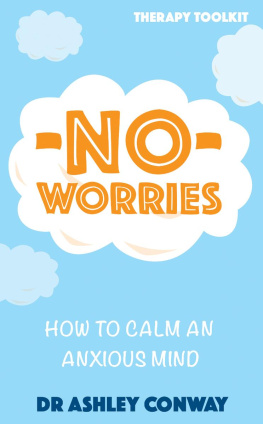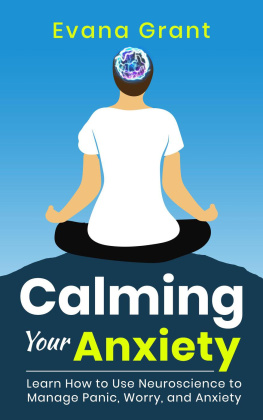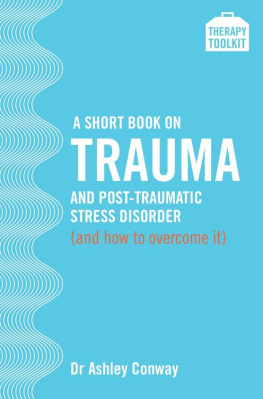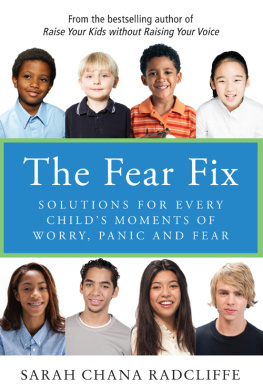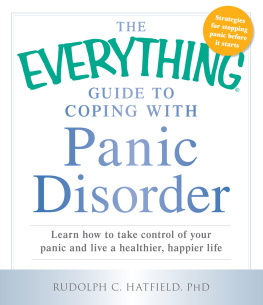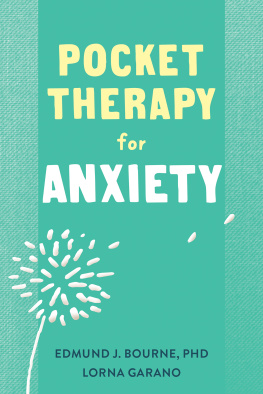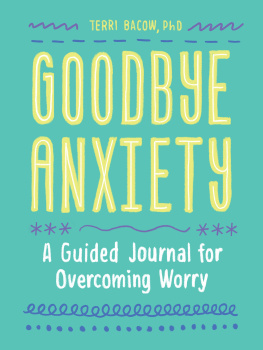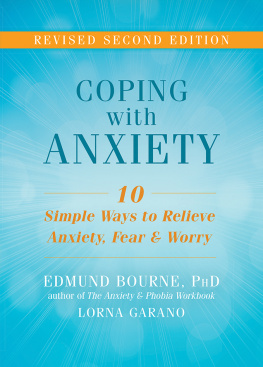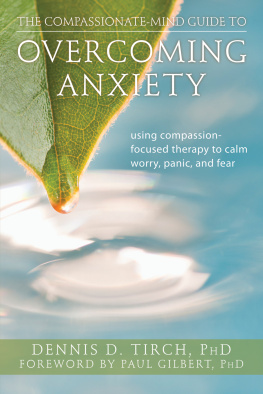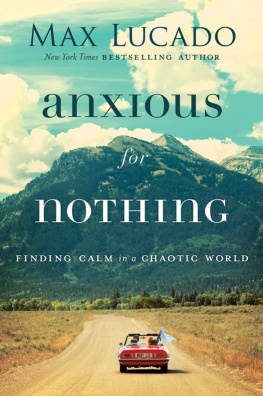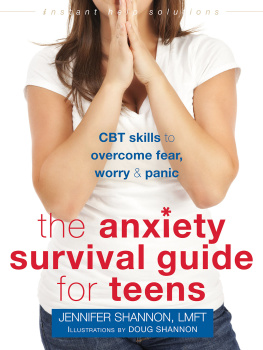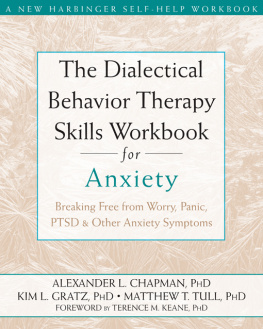I N THE 25 YEARS I have worked as a psychologist, Ive seen huge developments in the ways my profession has helped people cope with the problems they face. Interestingly, though, its not just the psychologists models that have changed, but also the kinds of problems that our clients present with and the number of people seeking assistance.
Of course, when looking at such trends, its not always easy to tell whether the incidence of a problem is increasing in real terms, or whether it simply appears that way because nowadays people are more likely to discuss it, and to seek support for it, than they used to be. My belief, however, is that when it comes to anxiety, the problem is genuinely on the increase, in terms of incidence and severity.
But why is this? There are probably numerous causes, but I believe that two particularly significant factors are (i) the way that we communicate now, and (ii) something that psychologists refer to as conditionality.
In terms of communication, it seems to me that the more technology we use to keep in touch with the world, the less time we have available to actually talk to each other. Added to this, the more we are being sold a fantasy in our online lives, the less we are engaged in what is real. Whats more, the quality of our communication is being reduced by the use of short bursts of words and abbreviations. After all, we now even have heads of state using less than 280 characters as a primary form of communication with the world. Is this a good way to deepen relationships? And does it improve our ability to understand what is going on in the world around us?
Human beings are social animals, yet we seem to be losing our way of making real contact with others. We have to be cool teenagers, great parents, have successful jobs and keep our children constantly occupied and entertained with activities that we think will improve their chances. The competition is fierce. Daily life has become threatening. We continually feel forced to ask ourselves, Am I good enough?
And this leads to the second point I mentioned: conditionality. If we are held in high regard and liked or loved by our friends and family for who we are, we experience the benefit of what is known as unconditional regard, being liked or loved unconditionally which will generally enhance a feeling of wellbeing.
But if we can only feel OK about ourselves if we own the latest phone, wear the right labels and have a perfect body, our feeling of security is conditional. Consequently, if we cant have these things, or we lose them, we are likely to feel less secure and more anxious. To compound these issues, we live in a time that is pro-positivity for some reason we are not allowed to express feelings of sadness, doubt or fear. Employers and friends seem to want us to be happy all the time.
Its this constant self-doubt, I think, that has become much worse over the last two decades, and as a result the invisible scourge of insecurity and anxiety has increased in people of all ages and cultures. Anxiety may not be as easily observable as a limp, or an arm in a sling, but it is highly pervasive and can be severely disruptive to the people living with it.
But and finally we get to the good part there is a solution. Anxiety can be overcome. We can apply a whole range of strategies to reduce and even eliminate anxiety, and live happy, confident, healthy lives.
What is anxiety?
Anxiety is often thought to have the same emotional basis as fear, but there are key differences in these two states of being. Fear is the emotional response to a real or perceived imminent threat. Anxiety is the anticipation of some negative future event (which may or may not be specific). It is worrying even when there is nothing objectively wrong, or to a level that is disproportionate to the actual risk. It may involve spending a lot of waking hours dwelling upon something, and seeking frequent reassurance from others. The focus of the worry may shift from one thing to another for example from ones own health or wellbeing to the health of loved ones, or to work or finances.
Anxiety functions in a loop between the mind and the body. Negative thoughts can trigger adverse physical reactions, and those reactions can trigger worrying thoughts (Have I got something wrong with me? Am I ill? Losing the plot?). These thoughts can, in turn, trigger further physical reactions, and so the vicious cycle progresses.
What psychologists call an anxiety disorder involves excessive anxiety and worry, apprehensive expectation and a tendency to catastrophise about a variety of events or activities. People talk about a feeling of dread or impending doom and experience a range of physical symptoms feeling restless, on edge or irritable, getting easily tired, having difficulty concentrating or finding their minds going blank, depersonalisation (feeling detached from themselves, almost as if they were observing a movie of their actions), derealisation (feeling detached from the world, experiencing others and their environment as if it were unreal) and the desire to escape from the place or situation that they find themselves in. It sounds almost unbelievable that our minds can do this to us, but as I will outline in this book, this response is the consequence of a mechanism developed through evolution that can become maladaptive in our modern world. The individual finds it difficult to control the worry symptoms, which may be accompanied by physical sensations, including increased sweating, feeling fidgety or hot, sleep disturbances, muscle tension, faster breathing, trembling, a feeling of the heart pounding hard or quickly, dizziness or lightheadedness, and digestive tract irregularities. No wonder, then, that anxiety can cause such distress, and interferes to such a degree in peoples social and work lives.
What are the causes?
I believe that two major factors increase the likelihood of anxiety: a feeling of helplessness (i.e. of not being in control) and a lack of predictability. We cant help but notice that, on a macro level, the world is going through rapid change in unprecedented ways. Some of the factors that, in the past, would have helped maintain a sense of stability and constancy the extended family, religion, faith in our political systems, a sense of safety in the order of the world are often no longer there. Now, increasing urbanisation leads to overcrowding, which may in itself raise our stress levels, and although we may have millions of people around us, we seem to have lost a sense of community and feel more alone and isolated. Jobs feel less secure, and while a generation ago they began and ended in the workplace, now, with 24-hour access to communication and global working patterns, the boundaries between what is work time and what is downtime are increasingly blurred. Perceived wealth gaps (whether real or not) create further tensions in our society. On top of all of this, peoples attempts to cope with a demanding world by using recreational drugs and alcohol only make matters worse, and taking stimulants, such as caffeine or energy drinks, to overcome the after-effects of such substance use can then further escalate the problem.
Modern technology may have improved our lives in many ways, yet I cant help but feel that it has also created just as many problems social media, for instance, connects us with friends and family like never before, right across the globe, but it brings with it new kinds of pressures that we are not used to. An obvious example is the harm inflicted by online bullying and stalking, abuse generated and recycled, scams and threats and deceptions. Perhaps less obvious is the stress caused by being bombarded with images of what our bodies

